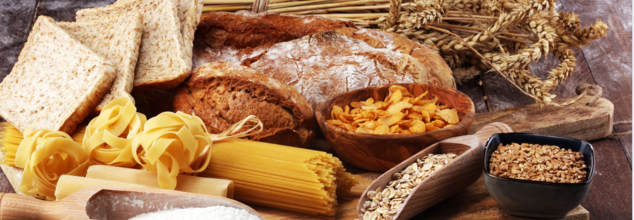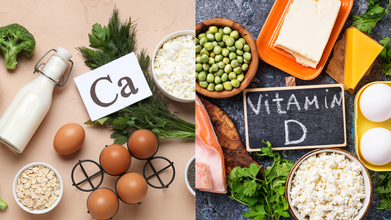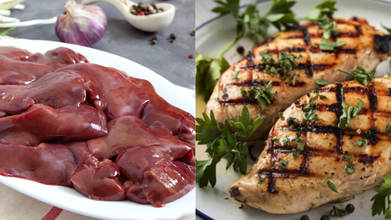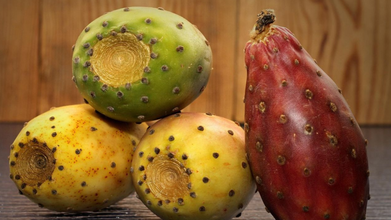- Health Conditions A-Z
- Health & Wellness
- Nutrition
- Fitness
- Health News
- Ayurveda
- Videos
- Medicine A-Z
- Parenting
14 Healthy High-Carb Foods For A Hearty Diet

14 Healthy High-Carb Foods for Your Diet
Blamed and shamed for so much of weight gain and chronic disease such as type 2 diabetes, carbs have suffered even with the popularity of low-carb diets. While it is true, not all carbs are alike, and many sources rich in nutrients and packed with fiber are important to the body for energy and proper brain function.
While foods high in sugar and refined grains are meant to be savored in moderation, a wide array of nutrient-rich, higher-carb whole foods can power your body and even support fitness performance.
The three major nutrients are carbohydrates, and these supply the body with energy. A gram of carbohydrates supplies 4 calories, which makes it essential for physical and mental activities. After being consumed, carbohydrates are broken down into glucose, which supplies energy to the body in vital functions such as brain activity and red blood cell production. The excess glucose is stored in the muscles and liver as glycogen to be used when the body needs energy.
Carbohydrates are most important for exercise. Carbs taken before exercise will optimize glycogen stores and enhance endurance, allowing you to push harder during physical activity. Pre-workout meals should contain easily digestible carbs with lower fiber content to avoid digestive issues.
Here are the best high-carb foods that combine nutrition, energy, and versatility.
1. Brown Rice
Brown rice consists of 76.2 grams of carbohydrates per 100 grams uncooked, thus a powerful source for energy to sustain. Unlike white rice, brown rice is packed with bran and germ, offering fiber, potassium, manganese, and B vitamins. Thus, it's an easy staple for athletes and sportsmen who look to increase muscle mass or balance.
2. Oats
Packed with 67 grams of carbohydrates per 100 grams, oats are a nutritional goldmine. Rich in antioxidants, fibre, and micronutrients, they can be an integral part of breakfast options as overnight oats, porridges, or even pancakes made out of oats. Their slow-digestive carbs provide a constant boost of energy, sustaining all day. 3. Potatoes
Potatoes are very satisfying and nutritious because they contain 25 grams of carbohydrates per 100 grams. White potatoes are good sources of vitamin C and potassium, whereas sweet potatoes give a powerful dose of vitamin A and manganese. Eat them boiled, baked, or mashed to have a healthy and filling meal.
4. Pasta
A staple comfort food, pasta contains 65g carbohydrates per 100 grams when uncooked. Additionally, whole-grain pastas are higher in fiber and contain magnesium and B vitamins for digestion and healthy metabolism. Combine pasta with low fat protein and vegetables to form a well-balanced meal.
5. Bread
With 49 grams of carbohydrates for every 100 grams of bread, it is so easy to have energy by consuming bread. Choose brown or whole-wheat bread versions to increase fiber and nutrition, which aids in more satiety and greater digestive health. Bread certainly remains a versatile option either for sandwiches, toasting, or side dishes.
6. Quinoa
Quinoa contains 64.2 grams of carbohydrates for 100 grams and holds up to 16.5 grams of protein in this amount. Magnesium, iron, and fiber-abundant quinoa, besides being a good additive in salads or grain bowls, is an ideal dish to prepare for meal prep.
7. Buckwheat
Though often overlooked, buckwheat contains 33.5 grams of carbohydrates per 100 grams and is rich in fiber, aiding digestion and promoting fullness. Its nutty flavor works well in salads, soups, or as a base for hearty grain dishes.
8. Popcorn
A low-calorie, high-carb snack, popcorn contains 74 grams of carbohydrates per 100 grams. It is easy to digest and, therefore, an excellent snack before working out. Opt for air-popped popcorn for a guilt-free snack.
9. Carrots
Carrots are a great source of carbs, containing 10 grams per 100 grams. They are rich in vitamins A, K1, and B6, and potassium, supporting vision, immunity, and general health.
10. Chickpeas
Chickpeas provide 13 grams of carbs and 7 grams of fiber per 100 grams, with an added protein boost of 7 grams. Add them to salads, soups, or hummus for a filling, nutrient-packed meal.
11. Beans
Beans, such as baked and black beans, are rich in starchy carbs. With 15.5 grams of carbs per 100 grams, they are a good source of fiber and protein, making them a cost-effective and healthy option for meal prep.
12. Dried Fruit
High in carbs at 83 grams per 100 grams, dried fruit is an excellent pre-workout snack for endurance activities. It's nutrient-dense, so be mindful of your serving size to keep sugar consumption in check.
13. Bananas
Athletes love bananas because they contain 23 grams of carbs per 100 grams. The fast-digesting sugars provide an instant boost of energy, and the potassium helps prevent muscle cramping during exercise.
14. Sweet Potatoes
Sweet potatoes have a high amount of complex carbohydrates, with 20.7 grams per 100 grams. They are also rich in vitamins A and C and potassium, among other nutrients.
Carbohydrates, on the other hand, far from being the enemy, they are a macronutrient that powers your body and mind. Adding these 14 nutrient-dense high-carb foods to meals can improve energy levels and enhance physical performance and provide general health benefits. Seek whole, minimally processed options and enjoy carbs within a balanced, hearty diet.
The next time you hear someone demonizing carbs, remind them of their role as the ultimate fuel for a hearty, healthy lifestyle.
Is Vitamin D And Calcium The Same Thing?

Credits: Canva
Vitamin D and calcium, both are nutrients you body needs to function well. While both are different nutrients, often many people get confused because vitamin D and calcium both are important for strong bones. Lack of both could lead to an increased risk of osteoporosis or bone fracture.
However, these two nutrients are different, react differently to your body and works differently too. The sources too could be different. Let us understand how.
What Are Some Of The Foods Rich In Vitamin D
As per WebMD, here are the following vitamin D rich food items:
- Wild-caught salmon (600-1,000 IU per 3.5 ounces)
- Farm-raised salmon (100-250 IU per 3.5 ounces)
- Canned sardines (300 IU per 3.5 ounces)
- Canned tuna (236 IU per 3.5 ounces)
- Fresh shiitake mushrooms (100 IU per 3.5 ounces)
- Egg yolk (20 IU per yolk)
However, there is one source, often recommended as the best and natural source, that is the exposure to sun. In this case too, one must keep in mind the sun burn, as it could cause skin problems, including skin cancer.
Beverages like milk, orange juice, yogurt, cereals too often have vitamin D added into them.
Vegan sources include
- Soy, almond, or oat milk (100-144 IU per cup)
- Cereal (80 IU per serving)
- Margarine (60 IU per tablespoon)
- Orange juice (100-105 IU per cup)
What Are Some Of The Sources Of Calcium?
- Cooked kale (179 mg per cup)
- Cooked collard greens (266 mg per cup)
- Dried figs (65 mg per 2 figs)
- Cooked broccoli (60 mg per cup)
- Oranges (55 mg per orange)
- Canned sardines with bones (325 mg per 3 ounces)
- Canned salmon with bones (180 mg per 3 ounces)
- Ricotta (335 mg per 4 ounces)
Vegan sources include:
- Canned baked beans (160 mg per 4 ounces)
- Cooked broccoli rabe (100 mg per cup)
- Cooked bok choy (160 mg per cup)
- Fortified almond, soy, or rice milk (300 mg per 8 ounces)
- Fortified fruit juices (300 mg per 8 ounces)
- Tofu prepared with calcium (205 mg per 4 ounces)
- Fortified cereal (100-1,000 mg per cup)
What Are The Roles Of Vitamin D And Calcium In Your Body?
As per the Bone Health and Osteoporosis Foundation, calcium is a mineral that builds and maintains dense, strong bones, while Vitamin D is a hormone that enables the body to absorb that calcium from food. Calcium also assists with nerve, muscle, and vascular functions, whereas Vitamin D is primarily responsible for calcium regulation.
Role: Calcium is a building block for bones and teeth; Vitamin D is the "key" that unlocks calcium absorption.
Definition: Calcium is a mineral (found in dairy, leafy greens); Vitamin D is a fat-soluble nutrient/hormone.
Source: Calcium comes from diet, while Vitamin D is produced by the skin via sun exposure in addition to food sources.
Deficiency Symptoms: Low calcium can lead to weak bones (osteoporosis). Low Vitamin D can cause soft bones (rickets in children) and prevents calcium absorption.
Chicken Breast vs Chicken Liver: Which One Is Healthier?

Credits: Canva
Dr. Dominik Nischwitz, a dentist based in Germany, highlights on his Instagram that organ meats like liver are a nutrient-dense food, calling them "nature's multivitamin via real food," and suggests that eating organs was historically "prized & classed as a real luxury". His perspective aligns with how predators in the wild often prioritize organs like the brain, heart, and bone marrow over muscle meat.
A key reason for this prioritization is the immense concentration of nutrients in organs, which are essential for running "EVERY biochemical process in the human body especially your metabolism".
He has also posted on his Instagram @drdome1, comparing chicken liver with chicken breast. The post noted that chicken breast has 165cals per 100grams, while liver has 167cals per 100grams. However, the chicken breast has 0% vitamin A, 0% vitamin C, 1% folate, and 6% vitamin B12. Whereas, he noted that chicken liver has 267% vitamin A, 47% vitamin C, 144% folate, and 281% vitamin B12.
Chicken Liver's Vitamin Powerhouse
Chicken liver is significantly richer in numerous vitamins compared to chicken breast, offering a high percentage of the daily value (DV) for several B vitamins and Vitamin A.
Vitamin B12: Chicken liver has a massive amount of Vitamin B12, providing 675% more of the daily needs compared to chicken breast. Per 100 grams, chicken liver contains 16.58 μg of Vitamin B12, while chicken breast only has 0.37 μg.
Vitamin A: Chicken liver is an exceptional source of Vitamin A, containing 482 times more than chicken breast. Per 100 grams, chicken liver has 11,078 IU of Vitamin A, compared to 23 IU in chicken breast. This high content is necessary for various processes in the body, including those that regulate metabolism.
Other B Vitamins and Folate: The liver is loaded with all B vitamins. Specifically, per 100 grams, chicken liver has more Vitamin B2 (1.778 mg vs. 0.125 mg), Vitamin B5 (6.233 mg vs. 1.04 mg), and Folate (588 μg vs. 4 μg). These are crucial, for example, with B2 helping make FAD for fatty acid utilization, and B3 needed to make NAD+.
While chicken liver excels in these vitamins, the one exception is Vitamin B3, which chicken breast is richer in.
Essential Mineral Content
In addition to vitamins, chicken liver is a standout source of key minerals.
Iron: Chicken liver contains 8.99 mg of Iron per 100 grams, which is significantly more than chicken breast's 1.14 mg. This represents a 688.6% increase in Iron content for the liver.
Copper and Selenium: The liver is an excellent source of Copper. Chicken liver has 0.492 mg of Copper, substantially more than the 0.054 mg in chicken breast. It also contains more Selenium (54.6 μg vs. 26.2 μg). The presence of copper is important for how the body handles oxygen.
Zinc and Manganese: Compared to chicken breast, chicken liver is richer in Zinc and Manganese, showing a 147.2% and 1114.3% increase, respectively, in these minerals.
Fats and Cholesterol: Although chicken liver has more beneficial nutrients, it also contains more Cholesterol (345 mg per 100g) than chicken breast (91 mg per 100g).
Protein, Calorie, and Misconception Facts
While chicken breast is generally a better source of protein (33.44 g vs. 16.92 g per 100g), chicken liver is still considered a "VERY good source of protein" and is "VERY cost effective". Calorie content is very similar, with raw chicken liver at 119 kcal per 100g and cooked chicken breast at 187 kcal per 100g.
The notion that liver stores toxins is a "bogus claim." In a healthy animal, the liver's function is to transport and remove toxins from circulation, moving them to "less important and energetic tissue such as adipocytes (fat cells)". Historically, humans consumed the whole bird or animal, including the carcass for bone broth, indicating a shift in modern eating habits toward only muscle meat like chicken breast.
Edible Cactus Can Cure Diabetes And Heart Troubles, Experts Say

Credit: Pixabay
Edible cactus, especially varieties from the genus Opuntia, has moved far beyond traditional cuisine and into the world of functional foods. Often eaten as cactus pads known as cladodes or as the fruit called prickly pear, this plant has been studied for its possible benefits in diabetes, cholesterol management and overall metabolic health.
But how strong is the evidence? Here is a clear and scientific look at what research says:
What Is Edible Cactus?
The most commonly studied species is Opuntia ficus-indica, widely consumed in Mexico and other arid regions. According to 2011 Journal of Food Science and Technology study, cactus cladodes are rich in dietary fiber, antioxidants, vitamins and minerals.
A 2025 Scientific Reports study also shows that cactus pear accessions contain bioactive compounds such as polyphenols, betalains, and flavonoids, which may help prevent chronic illnesses like cancer, diabetes and cardiovascular diseases, while supporting immune function, gut health and cognitive health.
Another 2021 Food Chemistry study describes cactus species as underutilized plants with strong nutritional potential. They are particularly high in soluble fiber which are important for blood sugar and cholesterol regulation.
How Could Cactus Help Blood Sugar?
Multiple researchers suggest that edible cactus can lower control blood sugar levels due to its high fiber and bioactive compounds.A 2022 Medicina study reviewed the use of prickly pear cladodes as a functional ingredient for hyperglycemia management and found evidence suggesting that consuming cactus pads with meals may reduce fasting glucose levels.
Normal postprandial (post-meal) blood sugar for adults without diabetes is typically below 140 mg/dL two hours after eating. For individuals with diabetes, the target is generally less than 180 mg/dL.
A systematic review by a 2019 Medicina study examined human trials on Opuntia consumption and found reductions in blood glucose and insulin levels, especially in individuals with Type 2 diabetes. However, the results were not entirely consistent across all trials.
More recent analytical research by the Chinese Journal of Analytical Chemistry suggests that cactus bioactive compounds may inhibit enzymes such as alpha-glucosidase and alpha-amylase, both key digestive enzymes that work sequentially to break down starch into glucose in the body.
These enzymes are involved in carbohydrate digestion. By slowing their activity, cactus components may reduce the speed at which glucose enters the bloodstream, suggetsing that cactus may help the body handle carbohydrates more gradually.
What About Cholesterol?
Cholesterol management is another area of interest. The high fiber content of cactus is again central and soluble fiber can bind bile acids in the intestine, increasing their excretion. As bile acids are made from cholesterol, the body may use circulating cholesterol to produce more bile, which can lower LDL levels.A Nutrition review and meta-analysis conducted randomized clinical trials on cactus pear and cardiovascular risk factors. They found significant reductions in body weight and some lipid parameters, though the overall quality of evidence varied.
Another 2024 Nutrition study also highlighted the potential of Opuntia species in managing obesity and related metabolic conditions, including dyslipidemia. Some studies reported reductions in total cholesterol and LDL cholesterol, particularly in individuals with metabolic syndrome.
However, the magnitude of these changes is generally described as moderate rather than dramatic.
But Are There Any Limitations?
While the findings are promising, the evidence has limitations.Many studies involve small sample sizes. Some trials are short-term. Preparation methods also vary widely, from fresh cladodes to powders, extracts, or capsules. Dosage differences make it difficult to compare results directly.
In addition, cactus should not be viewed as a replacement for medical treatment. For individuals with diabetes or high cholesterol, it may be a supportive dietary addition rather than a standalone therapy.
So, Can Edible Cactus Help?
Based on current research, edible cactus appears to have potential benefits for improving post-meal blood glucose and possibly lowering cholesterol levels. The effects are likely due to a combination of soluble fiber, enzyme inhibition, and antioxidant activity.However, the improvements observed in studies are generally modest. Cactus works best as part of an overall balanced diet rich in fiber, whole grains, fruits, vegetables, and healthy fats.
In summary, edible cactus is not a miracle cure, but it is a scientifically interesting and nutritionally valuable food. As research continues, especially with better-designed human trials, we may gain clearer answers about how strong its metabolic benefits truly are.
© 2024 Bennett, Coleman & Company Limited

